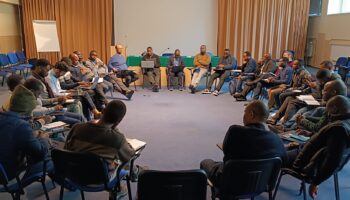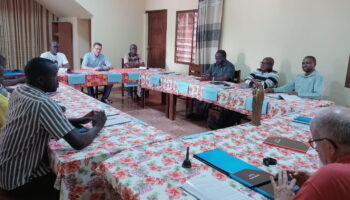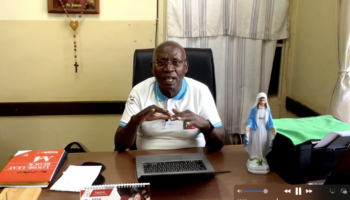
It is always instinctive in all of us to look to the Founder as a model for our missionary life and inspiration to an ever-greater commitment to follow his spirituality and teaching. May this reflection help us to walk towards what he insistently proposed to us: the holiness of life. From the letter of the IMC General Direction: “Our Consecrated Life”, nos. 50-56, 29/1/1995.
Fr Piero Trabucco, IMC, Castelnuovo Don Bosco
Missionaries “ad gentes” in the sanctity of life
We consider religious vows, in their problematic nature and value, as the sure point of reference for our vocation in the Church. It has already been said that religious life is situated in the order of holiness and that the practice of the evangelical counsels must be understood in the context of the call to imitate Christ to share his life and feelings. Lumen Gentium also emphasizes this: “The Church thinks again of the admonition of the Apostle, who, by inciting the faithful to charity, exhorts them to have in themselves the same sentiments of Jesus Christ” (LG 14). This contextualization of the evangelical counsels is reaffirmed in Chapter VI, where it is said that “the religious state imitates more faithfully and continually represents in the Church the form of life which the Son of God embraced when he came into the world to do the will of the Father, and which he proposed to the disciples who followed him” (LG 44).
It is clear, therefore, that we have not only committed ourselves to profess the three religious vows, but to imitate Christ in our relations with God and others (cf. Phil 2:5). This strong sense of our religious- missionary vocation, that flowed from the heart of the Founder, is expressed in the IMC Constitutions: “The goal that characterizes us in the Church is the evangelization of peoples; for the glory of God corresponding to his call of sanctity, for this reason the Founder he reiterated: “First saints, then missionaries”. This goal must permeate our spirituality, guide our choices, qualify our formation and apostolic activities, and give us a total direction in our lives” (Const. 5).
Mission: A Path of Holiness

Holiness is, therefore, for us the nucleus and secret of a life consecrated to the mission. It is also the key to a renewed zeal for the universal mission (RMi 90-91). This is the synthesis of the spiritual doctrine of Blessed Allamano, which proposes as the basis and guarantee for a mission lived in evangelical authenticity, striving for holiness consists of an ascetic, personal and is centred on the relationship with God.
Father and teacher of apostles, Allamano has his own proposal of Christian asceticism, free from any voluntarist perfectionism, balanced and full of common sense e far from eccentricities or irritating singularities, harmoniously rich in human values and spiritual qualities. For the Blessed Founder, the vocation to mission is a gift of God who demands man’s response. Holiness is not to be bought by effort but is acquired by humbly accepting God’s call to mission and making it the foundational experience of our existence.
Striving for holiness is indicated by the Founder as the primary goal of the Institute. Today we no longer distinguish between primary and secondary ends but consider holiness and mission as the two essential and integral dimensions of the same vocation. Mission is a path to holiness. Holiness is the soul of mission: “This is the will of God, your sanctification” (1Thess 4:3). “It would be a mistake to say: I joined the Institute to become a missionary and that’s all!” (VS, 111-112). “Therefore, first saints, then missionaries, one end helps another. If anyone has entered the Institute without these ideas, let him try to convince himself of it, otherwise he is not in the right place.” (VS, 112-113). Holiness, coherence of life, the search for communion with God redound to the benefit of the mission and guarantee its secret and mysterious efficacy.
“Doing the Good Well”
It is necessary for the missionary to speak first with the holiness of his own life; therefore, he is required to “go further” in prayer, mortification, and charity; in a word, a greater holiness, a holiness above the ordinary. “Souls are saved by holiness”. This is what our missionaries in Africa experience every day: certain conversions can only be obtained through holiness” (VS, 113).
In Allamano’s understanding of the path to holiness, there is no exaggeration or extravagance. For him, striving for holiness is a source of peace, serenity, and inner balance. It is a determination to find answers and methods for today, to overcome mediocrity, to stifle trivial desires, hesitations, and convenient solutions; to overcome the apathy that prevents impulses from flowing into a generous and constant effort to achieve it. Holiness requires a healthy forceful action on oneself and an all-encompassing commitment that avoids useless and short-lived desires that do not reach any goal. Holiness is practical exercise in the little things of everyday life so dear to Allamano. It is a matter of doing well what we have to do, seeking perfection even in the things that are taken for granted, conforming ourselves in everything to the will of the One we love. “It is not enough to do the good; it is necessary to do it well (…). This, my beloved, is the holiness that I would like from you: not miracles, but to do everything well. Let us be content, then, to become saints in the ordinary way. If the Lord will want to lift us to other heights, he will take care of it, let us not be bothered (…). I don’t care if you have given ten thousand baptisms, but if you have been excellent religious, excellent missionaries (…). Nothing extraordinary; but extraordinary in the ordinary. Let us become saints without clamour. It is not to do many things that matters, but to do them well” (VS, 129-30).
Those who embark on this path are asked, without exclusion, to stick to it generously even beyond weaknesses and failures. Alongside a determined will, the Blessed Founder places the need to know oneself well, who we are in truth, without exaggerating in utopian self-exaltation or without becoming anxious in self-hurting depression. To overcome the limits of fragility and with clarity, simplicity, and realism, to walk in truth before God. In him, who is more intimate to us than we are to ourselves, we will find the courage to accept ourselves as we are, and we will be able to shape our temperament. At times, events compel us to walk and grow against the tide. “(You are) called to holiness, – Allamano teaches – and to a singular holiness. Therefore, let all things, even the shortcomings of others, work together for your good” (VS, 160).
The ideal of missionary holiness continually present in the teaching of the Father Founder is Francis Xavier, a holy missionary par excellence (cf. VS, 779-788): a man wholly of God, neighbour, and himself, a perfect synthesis of contemplation and action, human values and grace, intimacy with God and missionary itinerancy. His way of life, his austere poverty in the use of the goods of this world for the Gospel, and his intense prayer are not obstacles to his mission, but rather the secret of his effectiveness and his inexhaustible apostolic zeal.
Quality of life
In our recent reflections, especially after the last General Chapter, we have spoken insistently of “quality”. Well, the highest expression, in a qualitative sense, of our life is holiness sublimated in religious life.
Considered in this way, our doings question not our “doing”, but our “way of doing”, without roots, projects, community dynamism, without depth of life, and ultimately without God. To break the limits of environmental mediocrity, of doing as everyone else does, of doing what has always been done. It is hard for us to look beyond the preservation of our present, beyond the structures that have costed sweat and effort, beyond the forms of life and work, but where the spirit no longer has a place. We run the risk of making of the means an absolute, interested only in efficiency. Often we do not accept radical projects and in some cases, we risk becoming “snipers” of the mission.
The ideal remains: to be open to the joyful sharing of life and holiness, to fraternal communion as a way of life and work, to live obedience as total availability and definitive sacrifice.
It is true: mission is the reason for the existence if the Institute, our only title of glory; but it should not be confused with “doing” it at any price, even at the cost of essential values. It cannot be idolatry of oneself, of the means at our disposal and that we frantically seek in order to do and overdo. This type of mission is opposed to the mission of quality, endowed with intensity of being, of communion, in generous and hard-working service, in attentive commitment to the unfolding of history. Recently, our spirituality has proposed to us, as the soul of mission, compassionate love for the poor, the promotion of justice and peace, and enculturation. These have always been the marks of our identity as Consolata Missionaries and constitutive elements of the IMC sanctity of all time, beginning with those who, before us, have been reflected in the paternal face of the Allamano. To all he points out a single beginning, a single goal, a single center: Christ, the one sent by the Father, and mission as the completion of his work in the world. Holiness marks the path along which our way of living and carrying out our mission models itself.
God is our witness of how much we would like to be the first travelling companions for a service that qualifies our mission.
Unity of purpose
One cannot speak of religious life without speaking of community life. It is a constitutive part of religious life and of the Church herself. Jesus sends the Apostles to proclaim the Good News of salvation and to summon believers to live as brothers and sisters. The Acts of the Apostles present to us the first Christians united among themselves in sharing what they have, participating in communal prayer, in listening to the teaching of the Apostles (Acts 2:42-47).
Sometimes community life and apostolic life are contrasted, arguing that the former harms the latter. If you really want to do mission, it is argued, it is better not to be bound by community, schedules and regulations that end up hindering it. Or again: it is affirmed that missionary life does not offer the warmth of communal life and is not supported on the crutches of a monastery. This is structurally true.
Of course, those who reduce community life to a timetable, a rule, or the intimacy of a small group are mistaken. It is not the rule or the timetable that forms the community, but the spirit of the Gospel, even if the rule and the timetable can be useful at certain times. One can live under the same roof, true to the same rule and timetable, but wander on the fringes of community.
Community life lived as missionaries is much more demanding than any constitution, regulation or timetable can be, because it means being animated, like the first Christians, by “one heart and soul” (Acts 4:32). And this is not established by law, but by free choice. For Allamano, our community life consists in living in “unity of purpose”: to announce the same things, to love with the same heart, and to work with the same spirit for the realization of common projects. To live in this way is undoubtedly more demanding than to submit to a rule, and it is also extraordinarily more efficacious for the purposes of witnessing and the credibility of the Gospel.
It is only by achieving “unity of intent” that we will realize our vocation-mission, since the mission is not ours, but is entrusted to the Church of God which is mystery of communion.
Contemplatives in Mission
We have spoken of holiness, of mission in the sanctity of life, of quality in being and in doing. The last IMC General Chapter speaks also of contemplation. “A quality that we still hope will transform us into contemplatives of mission, as Father Founder wanted us to be” (p. 8).
“We believe that striving for holiness indicated by Allamano remains a real commitment that passes through the experience of God, the centrality of Christ, the spirit of contemplation, the incarnation in the present and flows into mission” (p. 49).
For some of us the word “contemplation” arouses fear and heightens susceptibility, “because – it is said – we are not contemplatives, but missionaries”, and so we continue to live a dualism that impoverishes us. It seems that the fear of crossing the threshold of personal resistance dominates us and prevents us from descending to the roots of our life project to reach the core of holiness. To seek the face of God, instead, means the all-encompassing unification of our lives in his Covenant plan. And for us, the Covenant is the mission with its multiple commandments carved in the stone of daily life: personal and communal prayer, work, solitude, meeting people, proclamation and service of charity, communion, and contemplation.
Unifying Life
We all know missionaries who live this covenant of love. Many of the dissatisfactions and emptiness that we feel in our religious-missionary life come from unresolved tensions: tension between being and doing, naturally prioritizing doing; tension between prayer and pastoral care to the detriment of true evangelization; tension between community life and the demands of the apostolate, to the advantage of a pseudo-apostolate that is not born of authentic communion and does not create communion; tension between the use and abuse of the means that are not modelled on the Incarnation of Christ, who from being rich became poor (cf. 2Cor 8:9) to walk alongside the poor; ultimately, a tension between religious life and mission to the detriment of both.
All these tensions, in the end, reveal the lack in us of an authentic contemplative dimension and therefore the absence of a mission with a great spiritual breadth that is integrated and quenches itself at the source of a genuine experience of God.
Contemplation and prayer are not identical, they are unified. Prayer is the privileged moment in which, immersed in a dissipating and dispersive activity, we come to unify our life in God.
(From the letter of the IMC General Direction: “Our Consecrated Life”, nos. 50-56, 29/1/1995).



